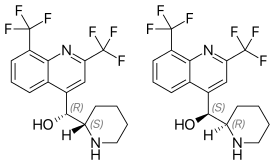Mefloquine
 |
|
 |
|
| Clinical data | |
|---|---|
| Trade names | Lariam, Mephaquin, Mefliam |
| AHFS/Drugs.com | Monograph |
| Pregnancy category |
|
| Routes of administration |
(tablets) |
| ATC code | |
| Legal status | |
| Legal status | |
| Pharmacokinetic data | |
| Metabolism | Extensive liver; main metabolite is inactive |
| Biological half-life | 2 to 4 weeks |
| Excretion | Primarily bile and feces; urine (9% as unchanged drug, 4% as primary metabolite) |
| Identifiers | |
|
|
| CAS Number | |
| PubChem CID | |
| DrugBank | |
| ChemSpider | |
| UNII | |
| KEGG | |
| ChEMBL | |
| NIAID ChemDB | |
| Chemical and physical data | |
| Formula | C17H16F6N2O |
| Molar mass | 378.312 g/mol |
| 3D model (Jmol) | |
| Chirality | Racemic mixture |
|
|
|
|
|
|
|
Mefloquine, sold under the brand names Lariam among others, is a medication used to prevent or treat malaria. When used for prevention it is taken once a week and should be begun one or two weeks before potential exposure and continued for four weeks after potential exposure. It can be used to treat mild or moderate malaria but should not be used to treat severe malaria. It is taken by mouth.
Serious side effects include potentially long-term mental health problems such as depression, hallucinations, and anxiety and neurological side effects such as poor balance, seizures, and ringing in the ears. It is therefore not recommended in people with a history of mental health problems or epilepsy. Common side effects include vomiting, diarrhea, headaches, and a rash. It is not recommended in pregnancy unless other options are not available. It should not be used during breast feeding.
Mefloquine was developed by the United States Army in the 1970s and came into use in the mid 1980s. It is on the World Health Organization's List of Essential Medicines, the most effective and safe medicines needed in a health system. It is available as a generic medication. The wholesale price in the developing world is about 0.6 to 1.3 USD per dose. In the United States it costs about 10 USD a dose.
Mefloquine is used to both prevent and treat certain forms of malaria.
Mefloquine is useful for the prevention of malaria in all areas except for those where parasites may have resistance to multiple drugs, and is one of several anti-malarial drugs recommended by the United States Centers for Disease Control for this purpose. It is also recommended by the Infectious Disease Society of America for malaria prophylaxis as a first or second line agent, depending on resistance patterns in the malaria found in the geographic region visited. It is typically taken for one to two weeks before entering an area with malaria.Doxycycline and atovaquone/proguanil provide protection within one to two days and may be better tolerated. If a person becomes ill with malaria despite prophylaxis with mefloquine, the use of halofantrine and quinine for treatment may be ineffective.
...
Wikipedia
